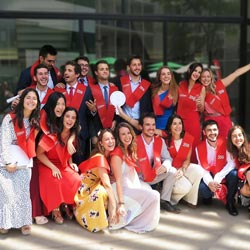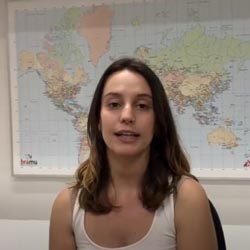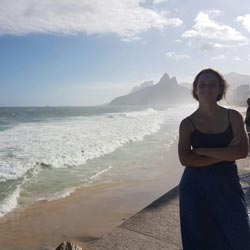Marta Ribera Carbó
8. alumni
“Understanding the Brazilian sociopolitical context is essential to work at the NGOs that operate there”
-
 Marta Ribera, double bachelor’s degree in Law and Economics alumna, former collaborator of Doctors Without Borders in Rio de Janeiro (Brazil) and current student on the Research Master’s Degree in Sociology and Demography at UPF
Marta Ribera, double bachelor’s degree in Law and Economics alumna, former collaborator of Doctors Without Borders in Rio de Janeiro (Brazil) and current student on the Research Master’s Degree in Sociology and Demography at UPF
When Marta Ribera Carbó, Law and Economics alumna (class of 2018), was studying at UPF, she made good friends she still has today. ‘For the six years of the degree programme, we made the university our home’, she says.
Until recently, her home and plans had shifted to Brazil: first, in 2019, as a researcher at the Sao Paulo International Human Rights Centre (CIDHSP) and then, since January 2020, to work in the Brazilian medical unit of Doctors Without Borders (MSF) in Rio de Janeiro. She has now returned temporarily to Catalonia, where she is pursuing a master’s degree at UPF and is a consultant for the Observatory of Economic, Social and Cultural Rights (Observatori DESC) on data management and analysis and researching social and economic rights.
‘In Brazil, with MSF, I was conducting a study on health and migration, trying to determine the different migratory routes, the diseases contracted before or during the route, and the doctor’s visits made and medications taken along the way’, Marta explains. She made sure that the data were being properly collected and analysed the results using statistical tools.
The parts of the study conducted in South Africa, Colombia and Zimbabwe were completed, but, due to the pandemic, the Brazilian part was suspended until further notice. ‘We collected and analysed the data from the parts of the study that could be finished and wrote up the final reports. The results were very well received and praised within the MSF movement. Now it’s up to the programme managers to design services that are better adapted to migrants’ needs’, she says.
‘The migration project has been postponed, and my work with MSF is done for now, but I don’t rule out continuing to do research in the third sector once I have specialized.’
According to Marta, the pandemic delayed the release of the final reports, since the team she was working with on the migration study had to collect and analyse the clinical data from the coronavirus projects that MSF had to launch urgently in Brazil. ‘Now the Covid-19 projects have closed and the migration project has been postponed indefinitely, and my work with MSF is done for now, but I don’t rule out continuing to do research in the third sector once I’ve specialized.’
Marta has returned to Barcelona for a period of one year and will be starting the research master’s degree programme in Sociology and Demography at UPF to specialize in data analysis for social science research. (‘I can now say that I am both a student and an alumna at the same time!’) After, she would like to return to Brazil, a country that she has very strong family ties in, or at least Latin America. ‘Brazil is an extremely complex country, almost a continent in itself, with a very well-structured network of local and international NGOs. Understanding the Brazilian sociopolitical context is essential to working at the NGOs that operate there, and it is crucial to study the dynamics that make Brazil the country it is today.’
Photo gallery
Marta Ribera in her graduation from UPF, at work and on a beach in Brazil



